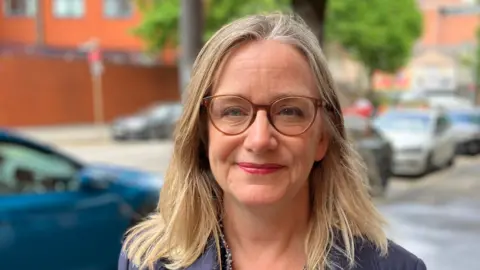'Food shop is my biggest expense after the mortgage'
Food shopping accounts for the biggest proportion of households' "basic spending" in Northern Ireland, according to research from the Consumer Council.
That is the highest level since it started monitoring these figures two years ago.
Every quarter it tracks what households earn and spend using data from Grant Thornton on how UK regions are impacted by the cost of living crisis.
The research suggests food costs account for almost a quarter (23%) of basic spending, which includes things like housing, clothes, health, transport and education.
Mum-of-three Jessica Ireland, from Londonderry, says her weekly food shop has increased by up to £50.
"At the minute, I would spend about £100-120 a week on food - that's for me, my husband, a five year old, a three year old and a baby," she told BBC News NI.
She used to spend £70-80 a week on food but has noticed a jump in recent years.
"It would definitely be - besides my mortgage - my biggest expense," she said.
"And it's one thing you can only lower so much because everyone needs to eat and kids need snacks, they need nappies and shampoo. You can only cut that cost so much."
Ms Ireland regularly posts videos comparing the cost of her food shopping on TikTok.
"Things have definitely gotten more expensive," she said.
"If they haven't gone up in price, they have definitely gone down in size.
"I had a Celebrations (chocolate) tub I'd kept from last year and then when I bought another one this year and put them side by side I was like wow! I thought I had got such a good price this year because it was the same as last year and then when I compared them it was considerably smaller than last year."
 Getty Images
Getty ImagesMs Ireland said rising food prices have impacted both how she shops and cooks.
"I now buy more own brand stuff, I am trying to cook more things from scratch because I do find that typically is cheaper," she said.
"I love to buy anything on offer and I love to shop the yellow sticker section. So that's the two big things I would always look out for on a shop."
Bread, milk, eggs and cheese
Ms Ireland has noticed a huge increase in the price of chocolate, in particular.
"I usually just wait for chocolate, the same as say cheese and butter, which are some things that I would have bought every single week," she said.
"I now try to wait until they are on offer and buy loads of it in one go.
"Eggs, I feel, have got really expensive and milk. It seems like a lot of staple items have got more expensive, like fruit, but I just try to shop that stuff on offer and try to stock up while it's on offer so I don't ever have to pay full price for butter, cheese or chocolate."
As for her advice for trying to keep costs down, she says planning is key.
"I don't ever go into the shops without a full list of exactly what I need, based on the meals," she said.
"I meal plan too, based on what's on offer, so if I notice a whole roast chicken is on offer, I'm going to have that for dinner that week which helps keep costs down."

The research by the Consumer Council also suggests the lowest earning households in Northern Ireland are spending more on their food shopping than any other bill.
Philippa McKeown-Brown, who is head of food policy, said: "Low income households are still spending the majority of their basic spend on food, outstripping housing costs, electricity, gas and other fuels.
"So that's really quite significant that such a big proportion of people's income is just to cover their food bill.
"Food is such a fundamental basic right, we all depend upon it and for that to be taking such a big proportion of people's spend, you have to wonder, what is being sacrificed because of it?"

Student Aimee Stevenson, 20, helps other students at Queen's University Belfast's pantry.
"Mostly, as students, we like to bulk buy our groceries and cook all at once and freeze a lot of things so you aren't spending as much money as often," she added.
But, she added, the demand for the food support service means they are helping as many as 100 students a day.
Young adults 'skipping meals and going hungry'
The cost of food was highlighted in a recent survey of more than 730 young people aged 18-30 by the Consumer Council, a cohort which it says can often be overlooked.
It found almost half of young adults fear their food will run out before they have the money to buy more.
More than two in five respondents said they were regularly skipping meals and a quarter reported going without food for an entire day.
The survey describes this as food insecurity, which refers to the ability to access food of the quality or quantity a person needs.
It suggests those more likely to struggle were young adults on a low income, those with a disability, with a food allergy or intolerance and those living in rented accommodation.
